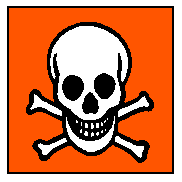International Chemical Safety Cards
| 1,2-DIBROMO-3-CHLOROPROPANE | ICSC: 0002 |
1,2-DIBROMO-3-CHLOROPROPANE |
 |
| TYPES OF HAZARD/ EXPOSURE |
ACUTE HAZARDS/ SYMPTOMS |
PREVENTION | FIRST AID/ FIRE FIGHTING |
| FIRE | Combustible. Liquid
formulations containing organic solvents may be flammable. Gives off irritating or toxic
fumes (or gases) in a fire. |
NO open flames. |
Powder, water spray, foam,
carbon dioxide. |
| EXPLOSION | Above 77°C explosive vapour/air
mixtures may be formed. |
Above 77°C closed system,
ventilation. |
In case of fire: keep drums,
etc., cool by spraying with water. |
| EXPOSURE | |
PREVENT GENERATION OF MISTS!
AVOID ALL CONTACT! |
IN ALL CASES CONSULT A DOCTOR! |
| INHALATION | Burning sensation. Cough.
Headache. Shortness of breath. Sore throat. Weakness. |
Local exhaust or breathing
protection. |
Fresh air, rest. Half-upright
position. Artificial respiration if indicated. Refer for medical attention. |
| SKIN | MAY BE ABSORBED! Redness. |
Protective gloves. Protective
clothing. |
Remove contaminated clothes.
Rinse and then wash skin with water and soap. Refer for medical attention. |
| EYES | Redness. Pain. |
Safety goggles, or eye
protection in combination with breathing protection. |
First rinse with plenty of water
for several minutes (remove contact lenses if easily possible), then take to a doctor. |
| INGESTION | Burning sensation. Nausea. Sore
throat. Vomiting. |
Do not eat, drink, or smoke
during work. |
Rinse mouth. Give plenty of
water to drink. Refer for medical attention. |
| SPILLAGE DISPOSAL | STORAGE | PACKAGING & LABELLING | ||
| Evacuate danger area! Consult an
expert! Ventilation. Collect leaking and spilled liquid in sealable containers as far as
possible. Absorb remaining liquid in sand or inert absorbent and remove to safe place. If
in the solid form, never dry sweep; vacuum with a device equipped with a high efficiency
filter and do not use for other purposes. (See notes) (extra personal protection: complete
protective clothing including self-contained breathing apparatus). |
Fireproof. Separated from strong
bases, food and feedstuffs, and reactive metals such as aluminium or magnesium. Cool.
Ventilation along the floor. |
Unbreakable packaging; put
breakable packaging into closed unbreakable container. Do not transport with food and
feedstuffs. T symbol R: 45-46-25-48/20/22 S: 53-44 UN Haz Class: 6.1 |
||
| SEE IMPORTANT INFORMATION ON BACK | ||||
|
||||